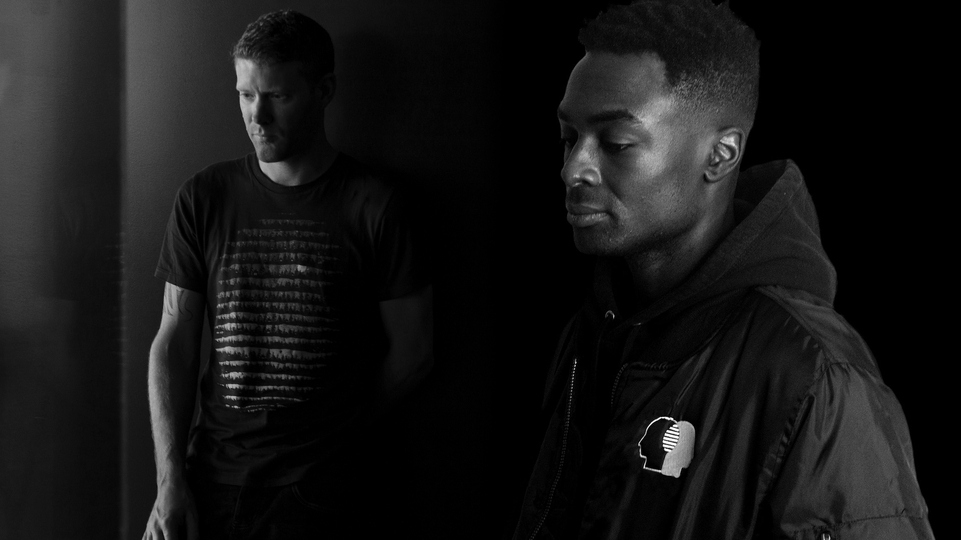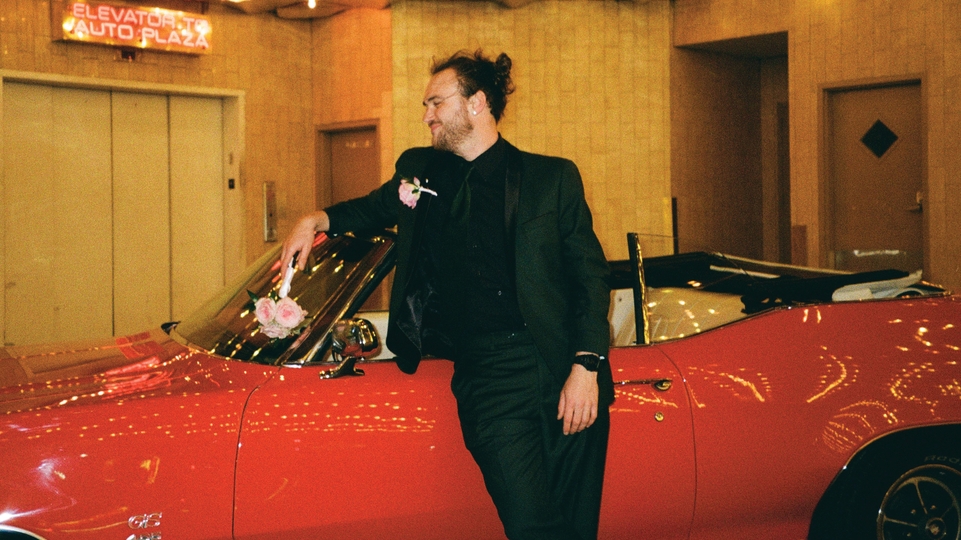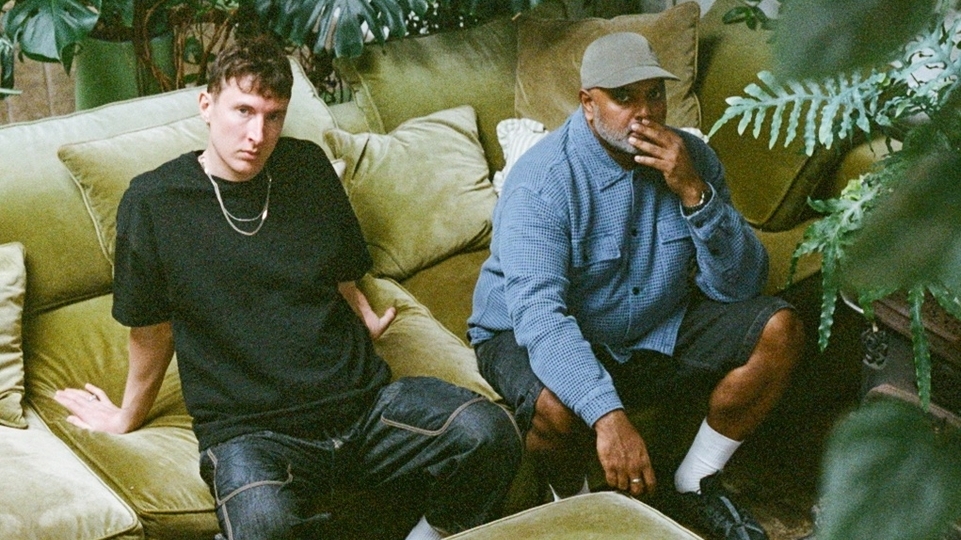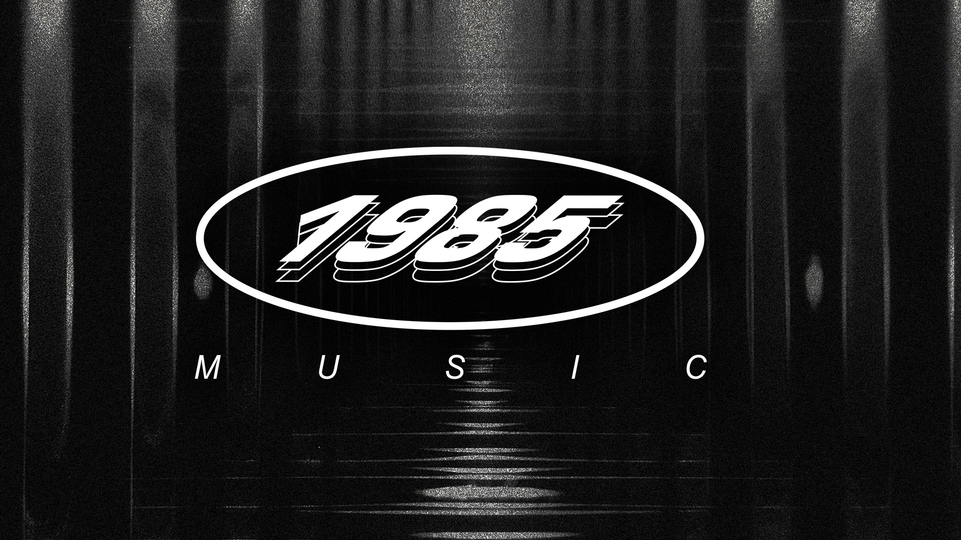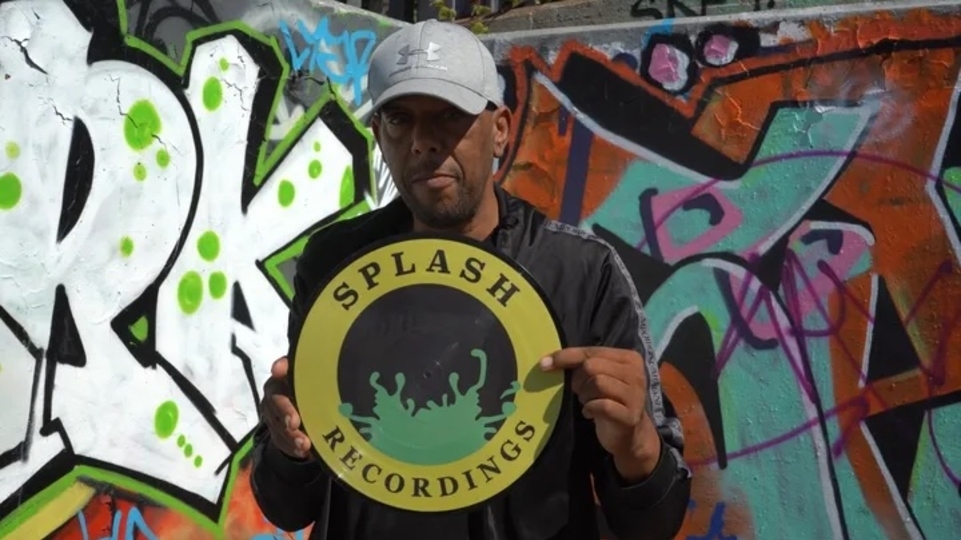
Krust: disrupting the pattern
Legendary drum & bass producer Krust’s first album in 14 years sees him foregrounding cinematic atmospheres, but not at the expense of his junglist roots. Ben Murphy catches up with him to find out what he's been up to for the past decade, and how he has developed as an artist through the years
The moment he saw the classic hip-hop film Wild Style, Kirk Thompson knew he wanted to be involved in music. From the age of 14 onwards, he lived a whirlwind life as DJ Krust: hosting warehouse parties in Bristol squats and having a Top 10 record while still a teenager, touring the world as a revolutionary drum & bass DJ. Running Full Cycle Records with Roni Size, forming part of the Reprazent collective, and amassing a vast catalogue on labels like V, Talkin’ Loud and Philly Blunt, for years he seemed on top of the world. But by the age of 35, what Krust really needed was a rest.
Mostly absent from the dance music scene since 2008, Krust is now revitalised. His expansive new album, ‘The Edge Of Everything’ — his first in 14 years, released on Crosstown Rebels — reveals a more cinematic and synth-driven side of an artist who has always pushed the boundaries of his genre. Drawing inspiration from his interests beyond sound, including modern art, film, spiritual texts such as the Kabbalah and the life-coaching consultancy he started since his extended sabbatical, it’s a deep listen that looks beyond the dancefloor, opening up a new stage in his long and varied career.
“I was burnt out,” admits Krust when DJ Mag calls him one early autumn afternoon. “I hadn’t had a break since I was 14, and it was this constant thing. I didn’t know who Kirk Thompson was anymore. I’d picked up the Krust name in school and I was always this guy. I lived my teens into my adulthood into my thirties that way, travelling around the world, performing. It came to this end point; where it says you’ve done all these textbook things you’re supposed to be happy with, but I was unhappy, so I took a step back. Since then I’ve been out in the wilderness studying, reading and relearning.”
‘The Edge Of Everything’ contains some of Krust’s best material yet. ‘Negative Returns’ is a science- fiction epic evoking gigantic ships looming in deep space; its halftime rhythm panning back to reveal dramatic sweeps of emotive synth, before a sinister descent into spiralling bleeps and NASA samples, and a scramble of bass-propelled beats. It’s a little like Dopplereffekt going drum & bass. Lead single ‘Constructive Ambiguity’, meanwhile, begins with nearly a minute of distant, whistling machine tone, before becoming a morphing soundtrack piece of dissonant noises, and finally erupting into bursts of metallic FM bass and skittering breaks.
On both tracks, the influence of film soundtracks is unmistakable. A step away from the club material Krust is known for, this album treats each track as part of a wider narrative arc, with the producer in the director’s chair guiding our mind’s eye. “I’ve fully engaged with understanding script writing,” Krust says. “The stages of a film, the hero’s journey; the story and character archetypes. I’ve tried to grasp that and apply it to this artform. But my canvas is digital, it’s keyboards. So I’m trying to obey film rules, but put the music to it.”
One way that that manifests on the record is through Krust’s focus on atmosphere rather than rhythm. Whereas in the past he’s often experimented with long-form pieces and beatless interludes, on ‘The Edge Of Everything’ he uses extended segments of ambient sound, sometimes not introducing the drums until halfway through a track. Krust says he enjoys keeping the listener on their toes, just as a film director would in a pictorial way.
“You’re allowed to be unpredictable and uncertain in movies, more than you are in music,” Krust says. “It’s always acceptable to have a surprise ending in a movie. Like, ‘Oh, I didn’t see that coming!’ But in music when you do it, it’s like, ‘Ooh, you’re breaking the rules’. What fucking rules? When did art become like that?”


Furthering this cinematic connection, on ‘Antigravity Love’, Krust collaborates with director Michael Williams. The latter’s spoken word delivery gives the song a tension and weight, the halftime rhythm reverberating to his strident Afro-futurist narrative of space and more earthly concerns. Krust visited him in LA and discovered that the filmmaker already had a monologue that would work with his sound.
“I’ve known Michael for many years, since the Reprazent days, and we’ve spoken often about collaborating,” he says. “When he gave me the vocal, straight away I could hear the song. It had this narrative in it, but when I listened to what he was saying, it was perfect for the story of my protagonist as well. It was great timing, a natural fit.”
It’s not the first time that Krust has experimented with the spoken word. The title track of his classic ’99 album, ‘Coded Language’, features New York poet Saul Williams; this form of expression, Krust believes, suits his music. “I like the energy of it. The fact that their delivery doesn’t specifically need to beatmatch, in the sense that a song would, or a rapper would.”
The title of the album, ‘The Edge Of Everything’, refers to the current moment. The COVID-19 pandemic has brought the many iniquities of society and politics, and the frightening speed of climate change, into startling relief. The album’s sense of disquiet, Krust reckons, comes from being aware of that situation and facing it head on.
“In the past you could put your finger on a problem,” he says. “It’s racism, it’s sexism or it’s poverty. It started to dawn on me that we were at this next point, in this convergence. There wasn’t a place where you could get relief. Everywhere you turned, it just seemed like there was this oppression coming from every angle. We’re on the edge of financial collapse, the edge of global catastrophe — the edge of everything. That was the macro, but the micro, I felt like that personally. I could see people were feeling that.”
Despite the uncertainty of the situation, there’s also a sense of cautious optimism that the outcome isn’t preordained. “This record was exploring being vulnerable, being weak, being afraid, but still going forward, without a plan, without a clue, without understanding what was going to happen,” Krust says. “You’re still going to dive in and see what’s on the other side. If I wasn’t willing to explore that, really stand on a precipice and put all of my faith in the unknown, I don’t think I would have been able to complete the project as I wanted to, which was this complete reinvention of who I was.”
The new record is being released by Damian Lazarus’ Crosstown Rebels, in what some might view as a surprising move from a label generally associated with house and techno. Lazarus, though, once co-ran and played at drum & bass club event PM Scientists (with Zoe Richardson), and has known Krust for years. For the latter, it’s just another way to disrupt expectations. “I said, ‘Do you know what, it’s a perfect match’,” Krust shares. “Damian’s got a great vision... it reminds me of what we were like at Full Cycle at the beginning. That spirit and energy of doing something different, not being obvious.”


Kirk Thompson grew up in the Knowle West area of a musically percolating Bristol in the 1980s. After discovering hip-hop, he concentrated on forming a DJ collective with his brother, J. “I decided that was gonna be my life. It was that crystal clear to me,” Krust says. Fresh 4 was born, adding local like-minds Suv and Judge to the mix. Inspired by other Bristol DJ crews like The Wild Bunch (who’d later become Massive Attack), 2 Bad, UD4 and FBI, Fresh 4 started to put on their own parties in youth clubs in the southwest of the city. Soon, they were running bigger warehouse raves from a squat.
“We had all our equipment in there, and we made a doorway through this scout hut, and started holding parties,” Krust says. His brother had been working on music under the Fresh 4 name, and a dub-influenced hip-hop cover of the Rose Royce classic ‘Wishing On A Star’ propelled the crew into the charts in ’89 — and helped create trip-hop, the genre that Massive Attack became most famous for.
“We got signed to the majors at 19,” he says. “We had a Top 10 hit, then got dropped eight months later. We went back to playing parties, figuring it out again. I had this experience, like, ‘Wow, I really like this music’. I didn’t know how to do it, but I spent three years in my brother’s back room, him teaching me how to use a sampler.”
With Suv and DJ Die, who he’d met at the squat, Krust started to hang out with Smith & Mighty, another important Bristol production duo who shared the same cut ‘n’ paste musical ethos. The producers let them use their sampler and Atari ST, and started to invite them to go to free parties that were happening in the surrounding countryside.
“Smith & Mighty used to go out every weekend,” Krust says, “and me and Die used to go with them; Thursday, Friday, Saturday nights, sometimes Sunday. At these raves, I started to hear a lot of hardcore. Every week we’d go, waiting to hear these breakbeat tunes. Easygroove was a guy who started playing a lot more of that style. He was our guy from Bristol, we started following him to these raves. After a while, we began experimenting with making that music ourselves — me, Die and Suv.”
When they met Roni Size, they recognised another kindred spirit, and the missing final part of the Full Cycle puzzle. “I knew his brother, who was in UD4,” Krust says. “He was a wizard on the decks. Suv said, ‘Roni Size has been making music as well, let’s chat with him’, so Roni brought some of his music around, and we just sat smoking weed listening to each other’s stuff. We’d never been in a room together, but he put his tape in and it was breakbeats, jungle — it was like, ‘Wow’. We played some of our stuff, he was like, ‘Rah’. That was it, we were inseparable for the next 15 years from that day.”
The four of them would go on to form one of the most influential labels/collectives in drum & bass, Full Cycle; concurrently, Krust was forging his singular production style. ‘Jazz Note’, released on V Recordings in 1994, pivoted around a hypnotic Detroit techno synth. Mixed with rolling breaks and booming sub-bass, it brought a deep sensibility into the scene few others beyond LTJ Bukem were attempting back then. “No one was really doing that at that time in jungle,” he says. “I was inspired by the R&S Records stuff. I did my version of what they were doing, really.”
While Roni, Die and Suv were having their own successes, Krust released heavy dancefloor records like ‘Quiz Show’ and ‘Angles’, bringing his B-boy persona to the fore on hardstep heaters under the names Glamour Gold and Gang Related, sampling Wu-Tang Clan and pushing grimy sub-bass up in the mix. “I was just doing me,” he reasons. “I’m a B-boy, so it was like, ‘How do I distinguish my brand from everybody else?’ At the time a lot of it was ragga orientated, but that’s not my background. Hip-hop was more my aesthetic, so it was easy for me to put those vocals in my tunes to differentiate myself.”
He also found the time to make futuristic soul-laced tracks like ‘Maintain’, featuring vocalist Morgan, the sinuous sound design of ‘Soul In Motion’, and in '97 released one of the all-time classics of drum & bass in ‘Warhead’. Built from little more than neck-snapping kick-snare breaks, and a swollen descending synth bassline, it was designed to cause maximum devastation.
“Everyone had their own sound then, so I kind of explored that and tried to figure out how you could create something that would tear your friend’s head off,” he says. “We were always pushing ourselves to outdo each other, and get to that next level. With ‘Warhead’, I had that bassline in my mind for a while. I’d heard it somewhere and it just kept going over and over in my head. I thought, ‘I’ve got to figure out how to use that’.”
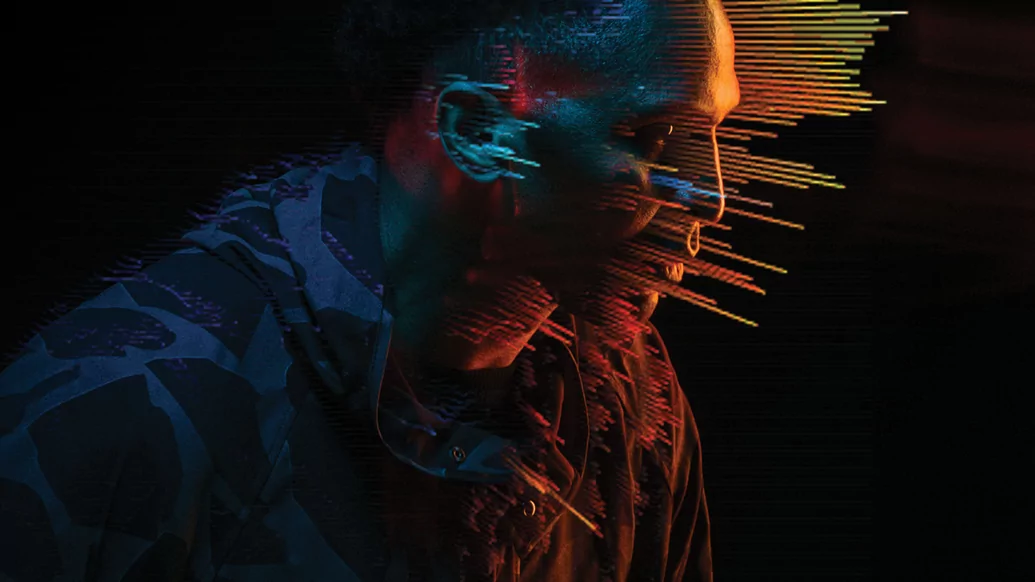

After being part of Reprazent, the Roni Size-fronted band that claimed the Mercury Prize for their epochal record ‘New Forms’, Krust made a classic album of his own, with ’99’s ‘Coded Language’. Released on the same label, the Gilles Peterson-fronted Talkin’ Loud, it allowed him to map similar cinematic terrain to that he charts on his latest album. Krust worked with a string arranger, live drummer, bassist and keyboardist, cutting up many hours of studio sessions and rearranging them as samples in a junglist framework. The result ranks among the greatest drum & bass records, up with seminal albums of the style by 4hero, A Guy Called Gerald and Goldie.
“I sat down with these musicians over a period of eight months, and sampled them,” Krust says. “Put them all in this pot, and said, ‘Thank you — now let me do my thing’. I went into my cave and started chopping everything up, using drum & bass ideas about production, and applying that to live musicians. It became like this classical jungle experience, where you’re using those sounds, but with the hard edge of the drums and bass, and this experimenting with the jungle mindset.”
For much of the ’00s he continued releasing records, including an album with DJ Die under the name I Kamanchi. But by 2008, Krust felt exhausted by the constant expectation. Soon afterwards, he launched a lifestyle-coaching consultancy, Disruptive Patterns, which aims to help others with creative thinking and overcoming personal challenges. The process has been hugely beneficial, as the practices he’s encouraged in others now find their way into his music production also.
“Disruptive Patterns is the way I approach things now,” he says. “I always have this mindset of thinking intuitively, using imagination. It’s a tool to really disrupt yourself: changing your thought patterns, your belief systems, tapping into your fears, your limitations. Figuring out ways to go to your next level.”
Fired up again by making music, and galvanised by the great reaction to his latest work, Krust is already busy with new projects, including a book, documentary and more. The future may be uncertain, but what he knows for sure is that he’s not going to play by the rules anymore.
“The minute I feel like I’m on the production line, I’m not going to do it,” he concludes. “What I have 100% certainty about is that I’m really good at what I do. For me to sit and explore all those avenues and possibilities, that’s going to be my answer to what the edge of everything is: me being my best and diving into it.”


